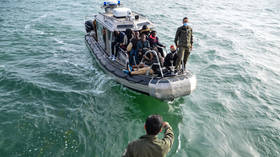More money will not fix EU’s migration problem – researcher

The EU has offered Tunisia €900 million (about $971 million) in long-term aid and €150 million in immediate support to the economy in order to stem the flow of migrants across the Mediterranean to Italy. However, the migration crisis has deeper roots and will not be solved by additional funding, international relations researcher Bechir Jouini has told RT.
The aid offer comes after Italian Prime Minister Giorgia Meloni visited Tunisia on June 6 to meet with the country's leaders and seek ways to strengthen its economy. She said that without financial stability in Tunisia, Europe could face a new wave of refugees and migrants from North Africa. She also asked the International Monetary Fund (IMF) to relax its lending standards for Tunisia.
Meanwhile, Tunisia’s President Kais Saied and Prime Minister Najla Bouden met on Sunday with European Commission President Ursula von der Leyen, Italian Prime Minister Giorgia Meloni, and Dutch Prime Minister Mark Rutte.
In addition to budgetary aid, they discussed possible investments in high-speed broadband, hydrogen projects and other renewable energy, as well as digital infrastructure to aid Tunisia’s economy. They also talked about separate funds for search-and-rescue operations for migrants and anti-smuggling operations in Tunisia.
According to a UN report, in the first four months of this year, 42,201 refugees and migrants arrived in Italy by sea, up from 10,761 in the same period last year. Of those crossings, 58% departed from Tunisia.
Jouini called the issues with migration “more a problem of the economy” that were created by the Western countries that colonized Africa. However, he believes that this is a problem that additional money “can’t solve.” “Migration is one of the effects of the colonization of this country,” he added.
The West cares about “their interests … about their countr[ries], they don’t care about either Africa [or] North Tunisia,” he concluded.












